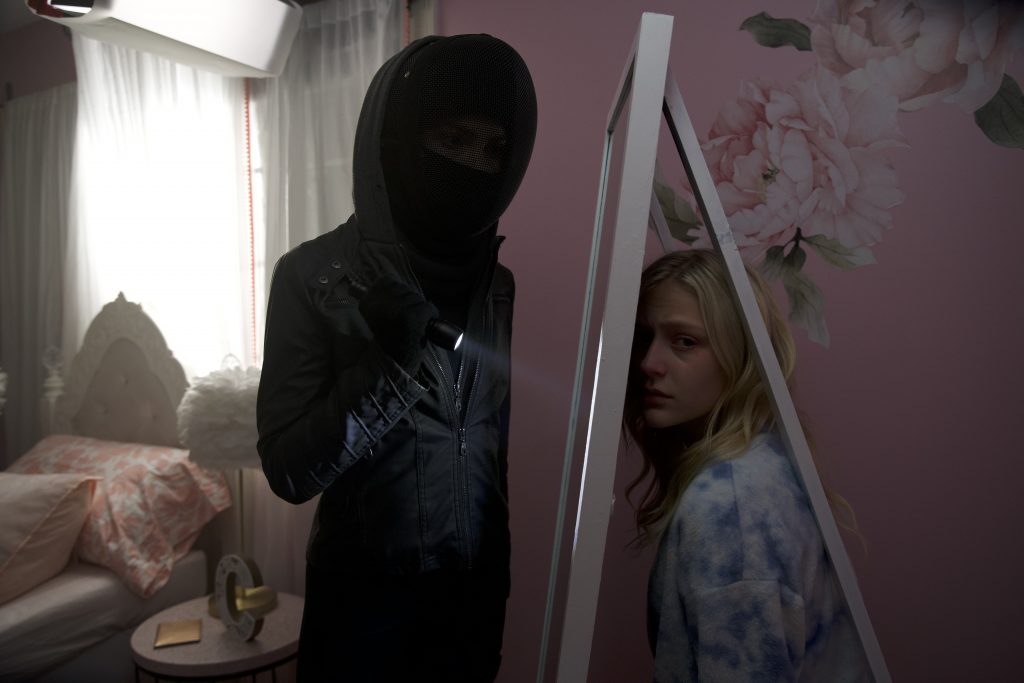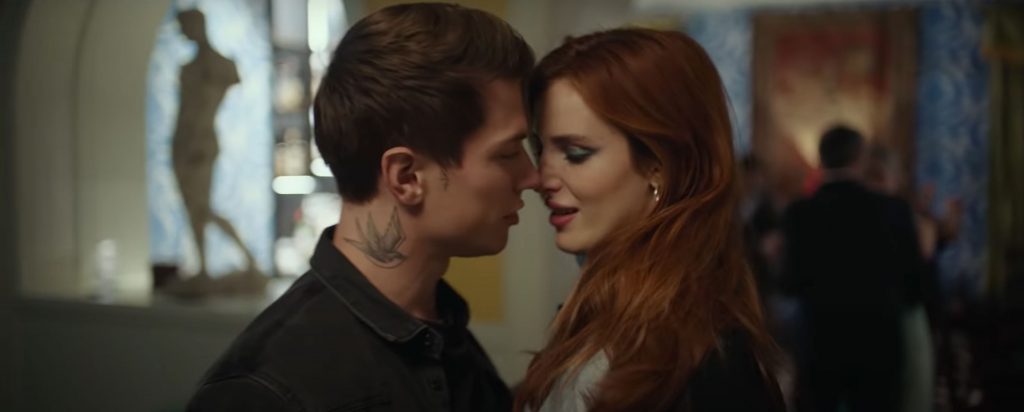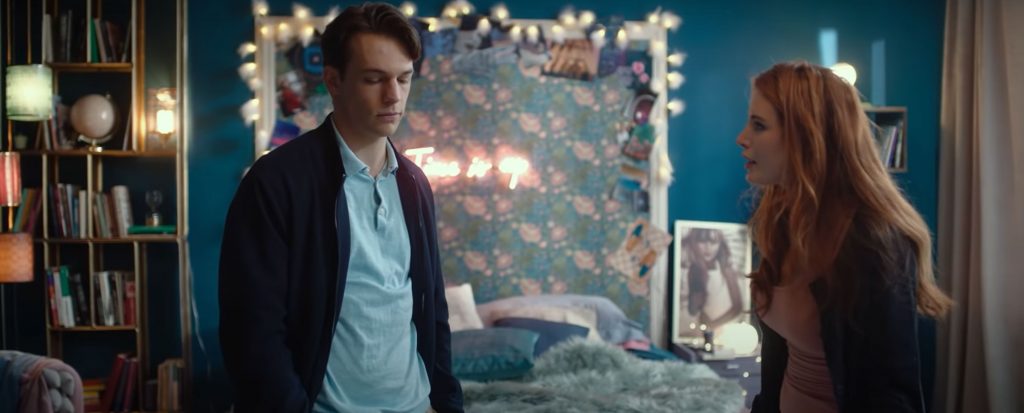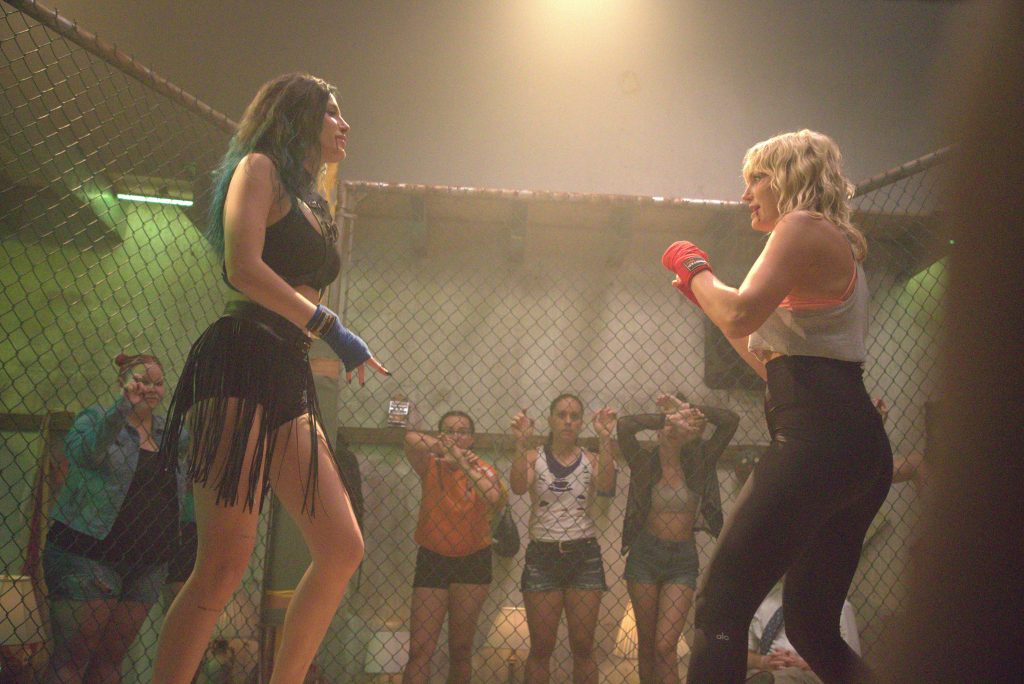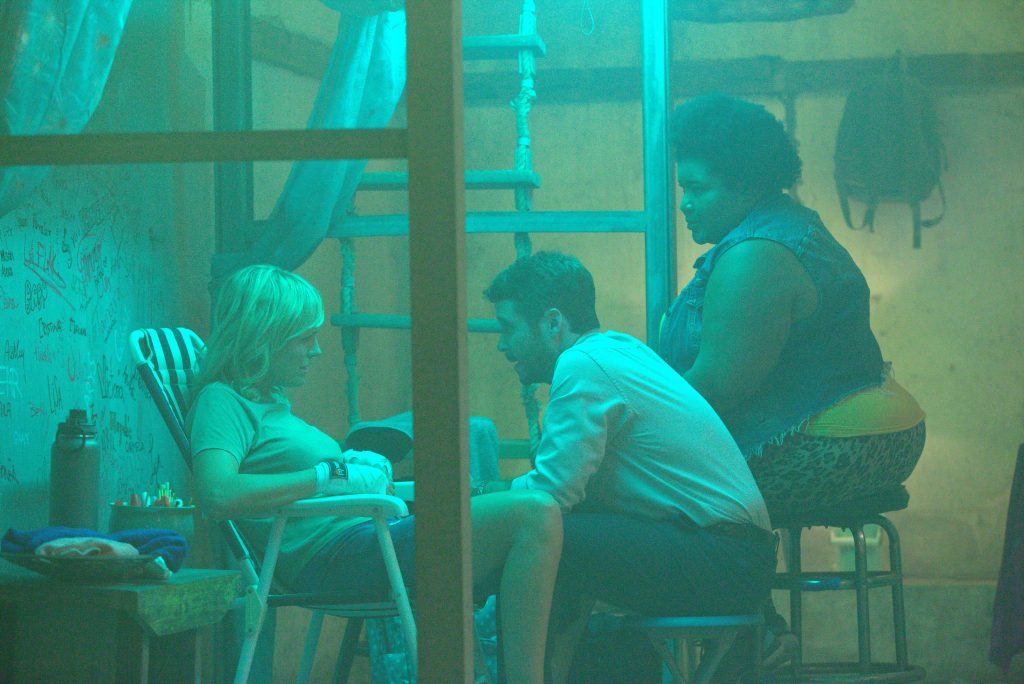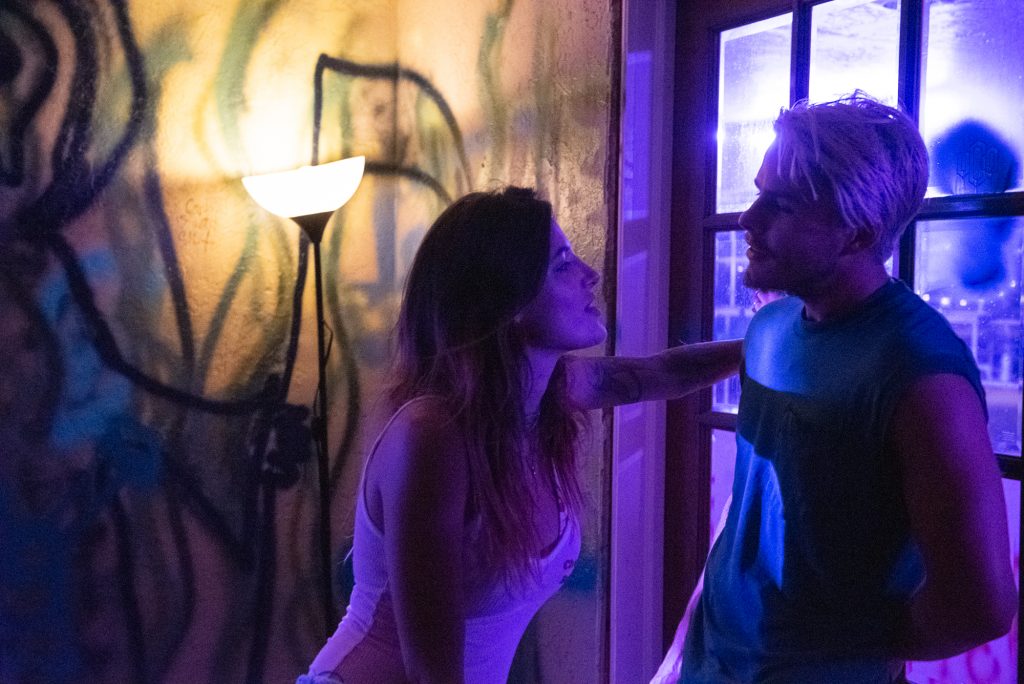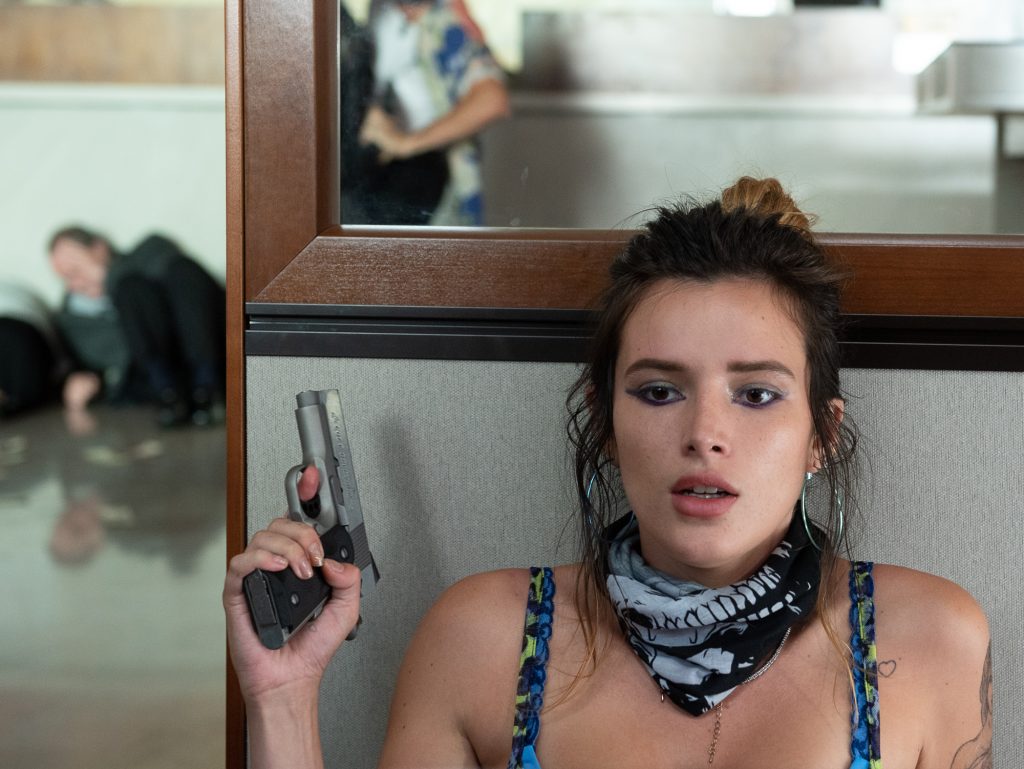April 9, 2022
by Carla Hay
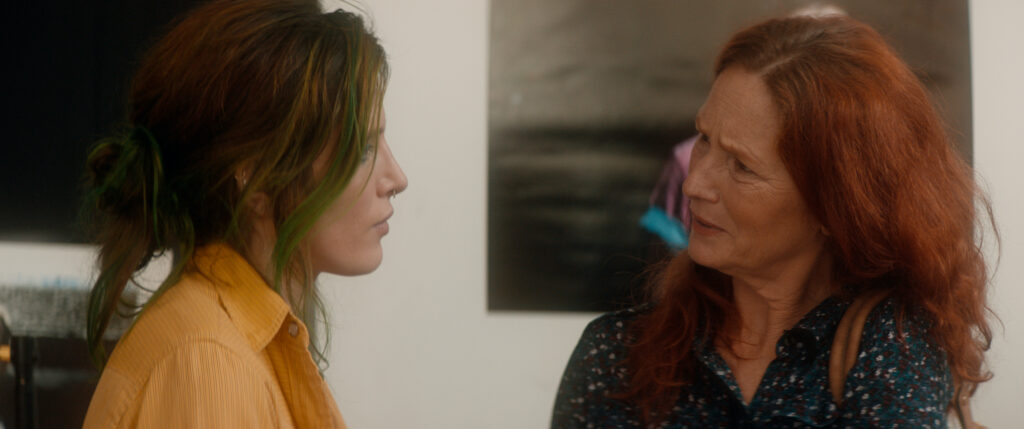
Directed by Peyfa
Culture Representation: Taking place in New York City, the dramatic film “Measure of Revenge” features a predominantly white cast of characters (with some African Americans and Latinos) representing the working-class, middle-class and criminal underground.
Culture Clash: A fairly well-known Broadway actress is out for deadly revenge against the people who supplied a dangerous drug to her musician son and his pregnant girlfriend, who both died from an overdose of this drug.
Culture Audience: “Measure of Revenge” will appeal primarily to fans of mindless vigilante movies, because nothing about this movie is appealing, interesting or well-done.
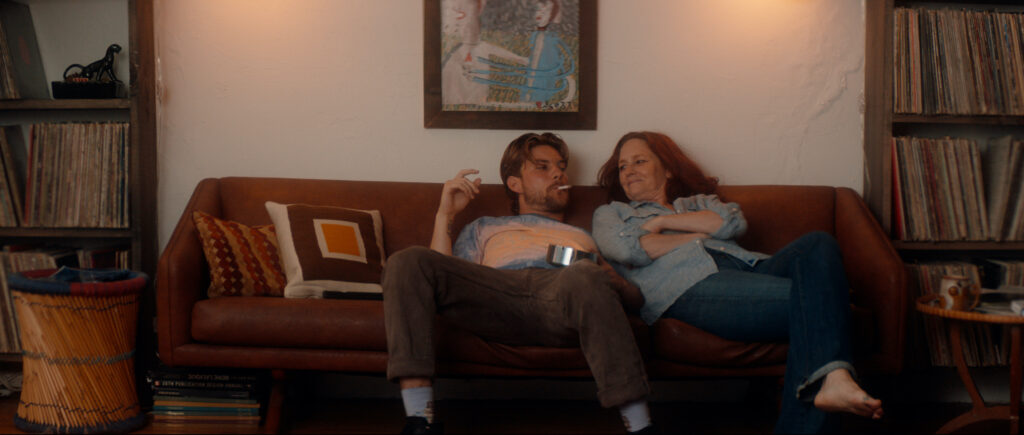
The crime drama “Measure of Revenge” is such an atrocious dud, no one wants to be listed as the movie’s screenwriter. And it’s easy to see why. It’s a heinous story about a Broadway actress who becomes a murderous vigilante on a rampage because she wants revenge for the drug overdose deaths of her musician son and his pregnant girlfriend. Directed by Peyfa (the alias of Peter Wong), “Measure of Revenge” is nothing but a complete embarrassment to everyone involved in making this pathetic excuse of a movie. “Measure of Revenge” was filmed on location in New York City, which is probably the only thing that looks authentic in this very awkwardly acted and fake-looking film.
What makes “Measure of Revenge” so cringeworthy is that the movie tries to look artsy by throwing in various themes and characters from William Shakespeare plays. “Measure of Revenge” sullies, trashes and insults Shakespeare’s legacy in ways that are even more offensive than the phony-looking murders that take place in the movie. Believe it or not, the unhinged vigilante in “Measure of Revenge” commits one of her murders during an intermission for a play where she’s performing on stage as the Ghost in “Hamlet,” without bothering to change her clothes or disguise herself during the murder. She then goes back to her dressing room, as if no one would notice that she committed the murder while decked out in the same costume and makeup as she wore on stage in front of an audience.
Get used to a lot of this type of silly nonsense in “Measure of Revenge,” which is a movie that’s hard to watch not just because it’s so moronic, but also because it takes itself so seriously. Maybe the filmmakers thought that having an Oscar-winning actress in the cast (Melissa Leo) would automatically improve the movie’s quality. Wrong. Leo gives a lackluster performance as vigilante actress Lillian Cooper, who doesn’t garner much sympathy for her vengeful actions because they’re so ludicrously stupid.
During the course of the story, Lillian appears in various revisionist productions of Shakespeare plays that wouldn’t be worthy of a Broadway stage in real life and certainly wouldn’t pass muster in any reputable performing arts school. In other words, expect to see amateurish, almost laughable versions of “Macbeth” and “Hamlet” in “Measure of Revenge.” The movie’s horrible ending takes this Shakespeare theme to an idiotic and corny level that proves that there was no hope in redeeming this creatively bankrupt flop.
In the beginning of “Measure of Revenge,” Lillian (who’s a widow) happily welcomes her wayward son Curtis Cooper (played by Jake Weary) into her apartment, where he will be staying with her after getting out of rehab for addictions to drugs and alcohol. Curtis is a semi-famous musician/lead singer of a rock band called Red Drums. Curtis’ addictions have caused the band to cancel an upcoming tour.
Curtis’ rehab counselor Mike (played by Michael Gruenglas), who drops Curtis off at Lillian’s home, gives her this advice about Curtis: “Don’t let him out of your sight. The first few days [out of rehab] can be very delicate.” Curtis’ father/Lillian’s husband Raphael Cooper died in 1997, at the age of 36, long before Curtis grew up to become a famous musician.
Lillian’s home (which looks like a two-bedroom apartment) is about to get more crowded, because Curtis’ loving and supportive girlfriend Olivia (played by Jasmine Carmichael), who’s a nurse, is moving into Lillian’s place too. And soon afterward, Lillian finds out that Olivia is pregnant and that Curtis plans to propose marriage to Olivia. Curtis shows Lillian the engagement ring. Lillian approves of these marriage plans.
However, Curtis’ life after rehab isn’t going that smoothly. One day, Lillian is in a diner to meet Curtis for lunch. She looks out the window and sees Curtis in an angry confrontation with some of his band mates. She can’t hear what the argument is about, but she sees Curtis hit one of the men with the guitar that Curtis is carrying. When Curtis goes in the diner, all he will say to Lillian about his band situation is this: “I can’t go back to that world right now. It’s not for me.”
Not long after that, Lillian’s world is shattered when she comes home to find Curtis and Olivia dead. The medical examiner reports list the official cause of their deaths as an accidental overdose of a drug called PMA, which is described as being like Ecstasy (MDMA), but more toxic. Of course, Lillian doesn’t believe the overdoses were accidental. She’s certain that Curtis and Olivia were murdered, or at least that whoever supplied the drugs should be held responsible for these deaths. The police—including a dismissive cop named Detective Eaton (played by Michael Potts)—are of no help, so Lillian decides to take matters into her own hands.
Along the way, Lillian encounters a jaded photographer named Taz (played by Bella Thorne, giving a very stiff performance), who sells drugs, including PMA. Taz knew Curtis because she did album covers and portrait photography for him and his band. Lillian goes back and forth on whether or not she can trust Taz, who has a gun and gets menacing when Lillian tries to threaten her with a knife.
Taz knows a lot more than she’s telling, but she still gives Lillian enough information to point Lillian in the direction of the people who are Taz’s PMA suppliers. Lillian also has conflicts with Red Drums manager Billy (played by Ivan Martin); band member Ronin (played by Benedict Samuel); record company executive Claude (played by Kevin Corrigan); and a drug lord named The Gardener (played by Jamie Jackson), who has that nickname because he slit a man’s throat using gardening tools. Predictably, not everyone Lillian comes in contact with makes it out alive.
“Measure of Revenge” also has a love quadrangle as a weak subplot. Lillian finds out that before Curtis and Olivia became an official couple, Olivia was romantically involved with Ronin, but Olivia cheated on Ronin with Curtis. Meanwhile, Taz had her own secret affair going on with Curtis when he was dating Olivia. It’s all just another sordid aspect to this cheap and tacky movie.
During her murder spree, Lillian finds time to still do her Shakespeare plays, including her role as the Ghost in “Hamlet.” (And fittingly, early on in the movie, Lillian plays one of the three witches in “Macbeth.”) She also become increasingly disturbed and starts having hallucinations, such as thinking that she’s Gertrude from “Hamlet.” Not surprisingly, Lillian gets no enjoyment or satisfaction from her sloppy and dimwitted crimes. The same can be said for anyone who experiences “Measure of Revenge,” a sloppy and dimwitted crime against cinema.
Vertical Entertainment released “Measure of Revenge” in select U.S. cinemas, on digital and VOD on March 18, 2022.

